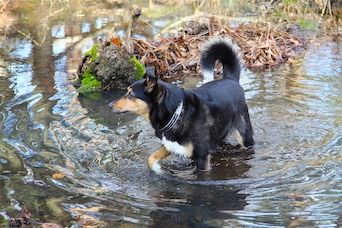Potential Pet Hazards After a Hurricane or Natural Disaster
What potential dangers should pet owners know about after a hurricane or other natural disaster?

Leading up to Hurricane Florence, much attention was focused on how to prepare for a natural disaster. And rightfully so—pets are at risk for many of the same dangers during a natural disaster that humans are.
But what people may not realize is that once the wind and rain subside, dangers are still present. Make your clients aware, in person and through your website and social media channels, of these 4 potential post-hurricane pet hazards.
Contaminated Water
Heavy, persistent rain and wind cause flooding and large pools of standing water that can quickly become breeding grounds for mosquitoes, ticks, and sandflies—all of which could carry disease. Pets that don’t receive regular preventives are susceptible to vector-borne diseases, such as heartworm and leptospirosis, if bitten by an infected vector.
RELATED:
- In Time of Need: Veterinary Practices and Natural Disaster Preparedness
- Canine Heartworm Disease Incidence on the Rise
Additionally, damage to an area’s water supply system may result in undrinkable tap water. Caution clients to abide by water advisories not only for themselves but for their pets as well. This includes having plenty of bottled water on hand to fill pet dishes.
Toxic water is a particular concern for pets that are left behind in evacuation scenarios because when left unsupervised, animals are more likely to drink contaminated ground water that has seeped into the house or pooled in the yard.
Disorientation
When returning to a town that has recently been affected by a hurricane or other natural disaster, it’s a good idea to reacclimate pets to their surroundings. In extreme cases, entire communities may have disappeared, including landmarks and scents to which animals were once accustomed.
Recommend that clients keep their pets on a leash when re-entering their home for the first time and to watch for signs of panic or anxiety when taking their dog for a walk in the weeks following a weather-related disaster.
Heatstroke
In many instances, areas struck by a hurricane are left without electricity for days and weeks at a time—even after a town may be considered safe for return. A power outage means no air conditioners or fans to escape the heat. Remind clients to provide their pets with plenty of fresh water and access to shade, and watch for signs of heatstroke.
Infectious Disease
Because evacuations sometimes result in group-living situations, pets might come into contact with unfamiliar animals that may be carriers for fleas and common illnesses, like kennel cough. This is another instance where preventive vaccinations and topicals are important. However, if a pet is unprotected, recommend that they are kept separate from other animals as best as possible. Once it’s safe to return home, clients should be encouraged to monitor their pets for signs of illness.